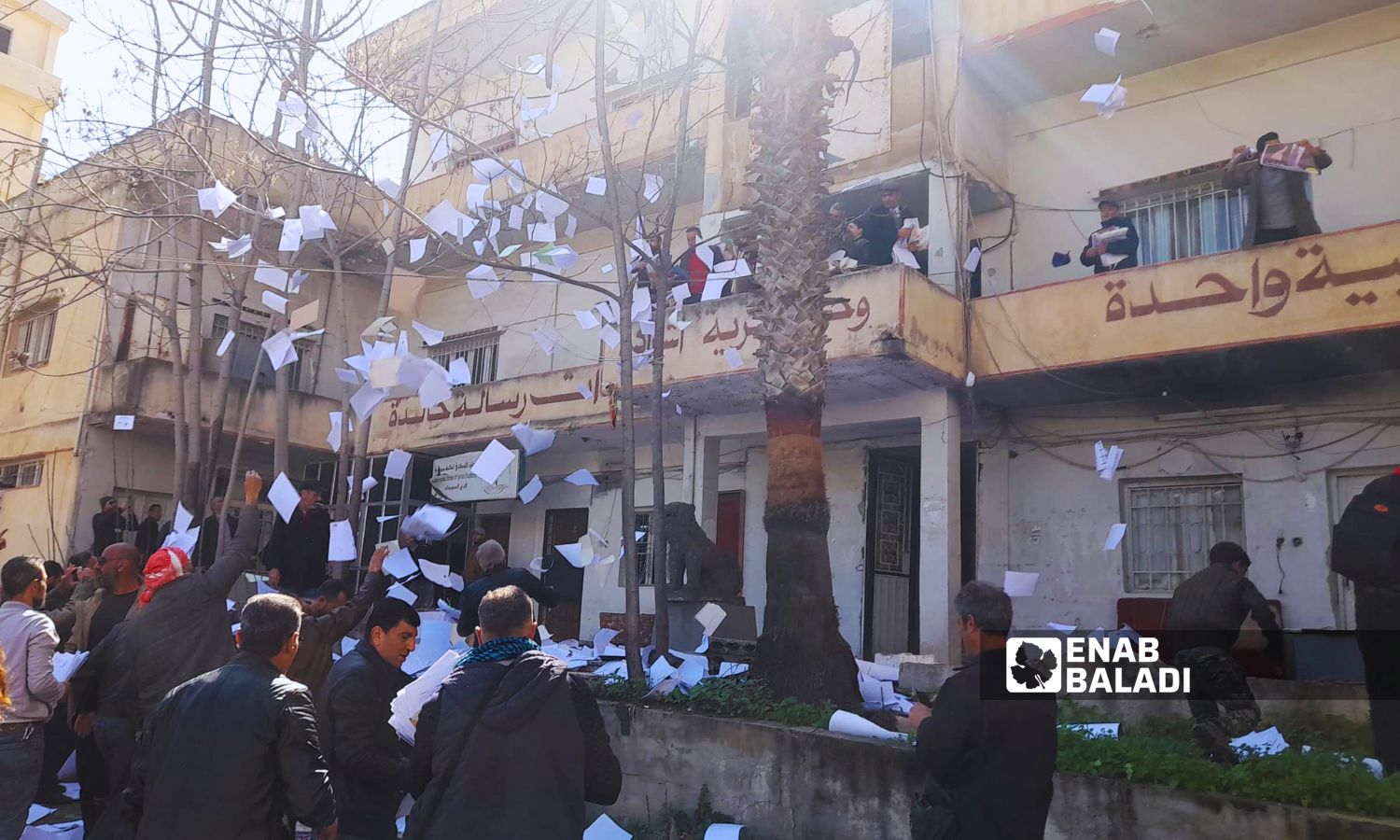Since August 2023, the governorate of Suweida has witnessed a revolt, marked by demands for the overthrow of the Syrian regime and the implementation of UN Resolution 2254, which advocates for a peaceful transfer of power in Syria to end the longstanding conflict.
The peaceful uprising, which has persisted on the streets of the province for over six months, has targeted the branches of the Baath party. Some of these branches have been repurposed into headquarters for charitable endeavors, while others have been closed altogether. Demonstrators have scattered security reports found within the party headquarters onto the streets.
Periodically, protesters in the province occupy the party branches, signaling a trend towards the disestablishment of the party’s presence in the region. Previously, the spiritual leader of the Druze Almohad sect, Sheikh Hikmat al-Hijri, had identified the party institution, alongside the security establishment, as one of the two entities causing suffering to the Syrian people.
Does Suweida exclude the party establishment?
In the initial month of protests in Suweida, demonstrators shuttered Baath Party centers across villages and towns in the governorate following an incident where protesters came under fire from a security group stationed in the party building in the heart of Suweida city. Fortunately, there were no injuries or damages reported.
During this period, local news outlets specializing in coverage of the province circulated photos and videos depicting the closure of partisan offices across the region.
One such outlet, al-Rased, shared footage showcasing the closure of the party’s headquarters in al-Ghariya village, located southwest of the governorate. Similarly, in Rima Hazem village, protesters repurposed the Baath Party headquarters into a charitable association’s headquarters.
Furthermore, protesters closed two Baath Party offices in the towns of Mazraa and Ghariya following the aforementioned shooting incident. It was reported that the demonstrators aimed to transform the Ghariya Division building into a kindergarten named Freedom.
Jamal al-Shoufi, a political affairs researcher residing in Suweida, informed Enab Baladi that the rejection of Baath Party branches in Suweida by its inhabitants is not an organized movement but rather a collective sentiment against the negative impact of this party institution on Syrian society, including Suweida.
Shoufi stated that the anti-party movements in the province stem from the Baath Party’s failure to heed the demands of the demonstrators to cease operations in the area, leading to the eventual closure of these party establishments by protesters.
However, Shoufi expressed skepticism regarding the demise of the party establishment in Suweida, as it remains tethered to the ruling authority in Damascus—a characteristic applicable to all Syrian provinces, not just Suweida. Thus, the party’s dissolution can only occur with the downfall of the ruling authority.
The researcher posited that the demand for political change under UN Resolution 2254, as advocated by the people of Suweida, symbolizes the end of the regime’s political hegemony and the dismantling of Baath Party control over Syria.
Are movements reflected on the street?
The party apparatus of the Syrian regime, under its control for many years, has been a focal point for security operations targeting regime opponents, often resulting in their arrest, as evidenced by security reports discarded onto the streets of Suweida by protesters.
As the movement in Suweida progresses towards curbing the longstanding presence of the party institution in the province, it prompts consideration of the potential implications of its demise.
Researcher Shoufi suggests that while the overarching trend is towards demanding political change at the national level in Syria, there are also perspectives advocating for halting the Baath Party’s activities in Suweida as a precursor to broader cessation across Syria post-political transformation. While plausible, this outcome remains uncertain.
He asserts that power in Syria will persist unless political change, whether in security apparatuses or partisan structures, is realized—a change that could extend to Suweida.
Regarding the impact of totalitarian ideologies, such as that espoused by the Baath Party, al-Shoufi notes that their demise hasn’t yielded unequivocally positive results since the onset of the Arab Spring in 2011. He warns of potential adverse effects on Syria and the wider region if demands to overthrow the regime are met, citing Iraq’s struggles post-Baath Party removal, marked by sectarianism, religious divisions, and political factionalism.
Given Syria’s aspiration for a state not monopolized by a single ideology, al-Shoufi emphasizes that the aim isn’t to sever Syria’s ties with the Arab world entirely but rather to dismantle the pervasive dominance of a singular ideology, allowing for diverse political engagement.
Drawing lessons from past experiences, al-Shoufi highlights Iraq’s challenges following the Baath Party’s removal, suggesting that a binary approach—total retention or total demise—is insufficient. Instead, he advocates for a continual push towards establishing a national state that fosters political freedoms.
This article was translated and edited by The Syrian Observer. The Syrian Observer has not verified the content of this story. Responsibility for the information and views set out in this article lies entirely with the author.


